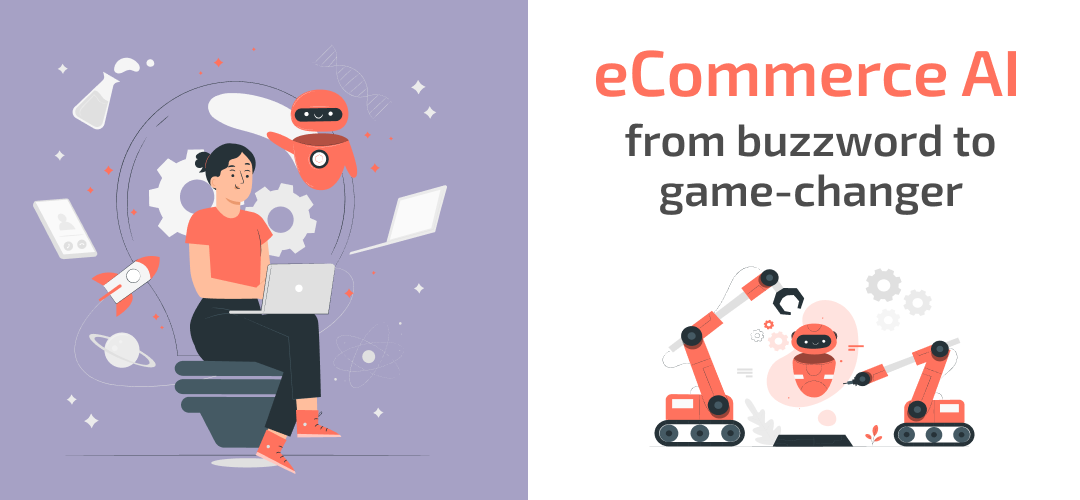
Since the birth of eCommerce giants (Amazon and eBay), online businesses are constantly seeking innovative solutions to enhance user experiences, streamline operations, and stay ahead of the competition.
As the digital realm continues to grow in complexity, the integration of Artificial Intelligence (AI) can offer unprecedented opportunities for eCommerce platforms. A recent report states that the AI-enabled eCommerce market size is projected to reach $16.8 billion by 2030, growing at a rate of 15.7% CAGR. But it isn’t only expenses statistics, it reveals investments in technologies that are most likely to define the eCommerce industry in the coming years.
So eCommerce AI is not just a buzzword and represents a paradigm shift in the way online businesses operate. From personalized shopping experiences and predictive analytics to efficient inventory management and fraud detection, AI is actively reshaping the eCommerce ecosystem.
How is AI changing eCommerce? In this blog post, we’ll try to find an answer to this question, shed light on its diverse use cases, understand a real-world impact of integrating AI into eCommerce platforms and, more specifically, how nopCommerce harnesses the potential of AI to prepare businesses for the future.
8 most common AI use cases in eCommerce
How does artificial intelligence affect business? Besides all this Al hype, businesses begin to understand its high potential and look for ways to add AI to their operations—be it content creation, customer service or inventory management.
Below you’ll find the most efficient AI use cases, and learn how to turn a common eCommerce solution into an AI eCommerce platform, integrating these features into your current system.
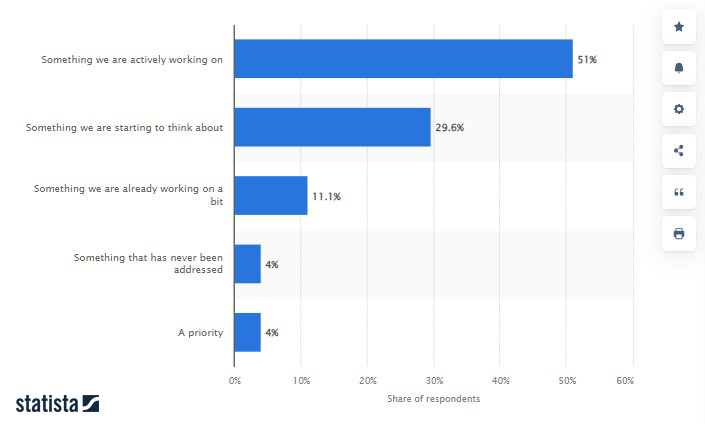
How do you assess a possible AI application in your eCommerce business?
1. Personalized product recommendations
AI is undoubtedly transforming personalization in eCommerce, as seen through the incredibly effective automated product recommendations that customers receive via email or when visiting their preferred eCommerce brand’s website.
For example, AI can display recently viewed products, run an automated and tailored email campaign, and curate a personalized product list. In this scenario, the content is dynamically shown by taking into account customers’ click-through, browsing patterns, and purchase history.
2. Smart search and discovery
In the vast world of online shopping, seeking the right product can feel like trying to find a needle in a haystack. An AI search for eCommerce brings together various techniques and practices like faceted search, navigation, autocomplete, recommended product listings, and recent searches to make the process easier.
Natural Language Processing (NLP) helps better understand the query a shopper enters or speaks to determine what they’re looking for and present the desired search results. AI also suggests synonyms, filling in missing words or phrases, and automatically correcting spelling mistakes.
What’s more, AI simplifies customer inquiries for individuals who prefer speaking or sharing images. Through visual search, AI technology can analyze an image, like a picture of someone wearing a particular item on the street, and recommend similar items.
3. Dynamic and optimized pricing
Another type of eCommerce AI optimization is dynamic pricing. Firstly, it’s possible to match the perfect price to each customer, i.e. adjust the price of certain products based on the likelihood of a user buying them at specific price points. This approach considers customer interactions and sets the overall price for the product to maximize profit or revenue.
Secondly, AI is capable of determining the ideal price for individual customers. By analyzing the products a person clicks on, adds to their cart, and buys, AI can modify the price of an item to increase the chances of a successful purchase for that specific customer. For example, it can offer lower rates to attract first-time buyers or price-sensitive customers.
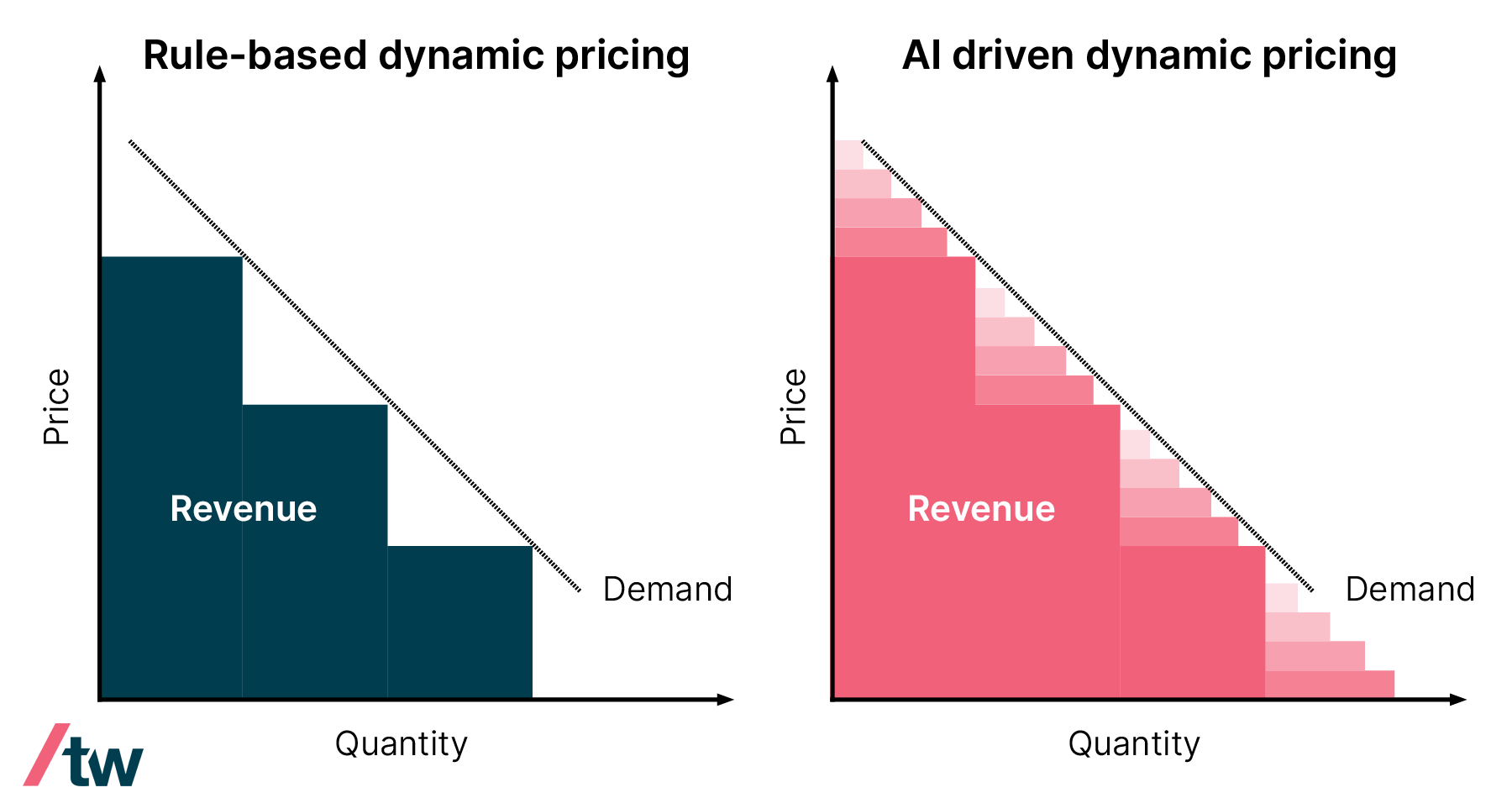
4. Product content generation
Integrating AI into eCommerce platforms has the potential to completely transform the way product content. With the help of AI-powered natural language generation, businesses can create captivating and consistent product descriptions, specifications, and marketing content on a large scale.
By analyzing product attributes, customer reviews, and industry trends, AI algorithms can create engaging and relevant AI content. This not only saves time and resources for businesses but also ensures that the content is uniform and of high quality. Additionally, AI can adapt the language and tone to align with the brand’s style, optimizing the content for SEO and enhancing the discoverability of products.
5. Inventory management and demand forecasting
Inventory management, previously a challenging task of balancing excess and insufficient stock, now heavily relies on AI algorithms to optimize stock levels. AI evaluates various factors, such as historical sales data, seasonal trends, supplier lead times, and even external variables like weather or economic indicators.
AI-powered eCommerce assists companies in effectively managing inventories, planning logistics, and utilizing warehouse space. In relation to demand forecasting, AI analyzes vast datasets to predict customer preferences and purchasing patterns. This empowers retailers to anticipate fluctuations in demand, optimize procurement processes, and minimize costly issues like overstock or stockouts.
6. Customer service and support
Despite the existence of contact forms, phone calls, and email, an AI chatbot solution for eCommerce is the fastest and most convenient means for visitors to get answers. The most advanced chatbots not only follow pre-set scripts but also learn and adapt from each interaction. They analyze customer input to offer precise responses and enhance customer satisfaction rates.
As a result, AI-powered customer service and support can easily scale up. There’s no need to burden a human support team with weekend and holiday work, as the chatbot can direct customers to relevant knowledge base materials, schedule callbacks, or take messages for agents.
7. AI-driven data analytics and insights
AI-driven data analytics helps businesses gain a deeper understanding of their customers, foresee upcoming trends and protect against fraudulent activities. One of the greatest advantages of AI is its ability to analyze data objectively, without any preconceived notions or biases, resulting in more accurate insights.
Through behavior analysis, AI categorizes customers into various groups, enabling businesses to execute highly targeted marketing campaigns, which is exceptionally valuable for AI in B2B eCommerce.
Businesses leverage AI to predict the lifetime value of customers and identify those who are at risk of churning. These techniques extend beyond individual customers as AI can analyze extensive datasets to anticipate market trends and demand patterns.
8. Fraud purchases detection
AI has the power to greatly improve fraud detection in eCommerce. By using sophisticated algorithms, it can analyze large volumes of transaction data and spot any unusual patterns or suspicious activities in real-time.
Through machine learning, AI models can learn from past cases of fraud and stay updated on the latest tactics used by fraudsters. This enables them to identify irregular purchasing behaviors, abnormal payment patterns, and other signs of fraudulent activities that might be missed by traditional rule-based systems.
All in all, the most popular eCommerce AI use cases have been summarized by Statista, showing that a major focus is on improving current features (search, pricing, etc.) and looking into the future (forecasting).
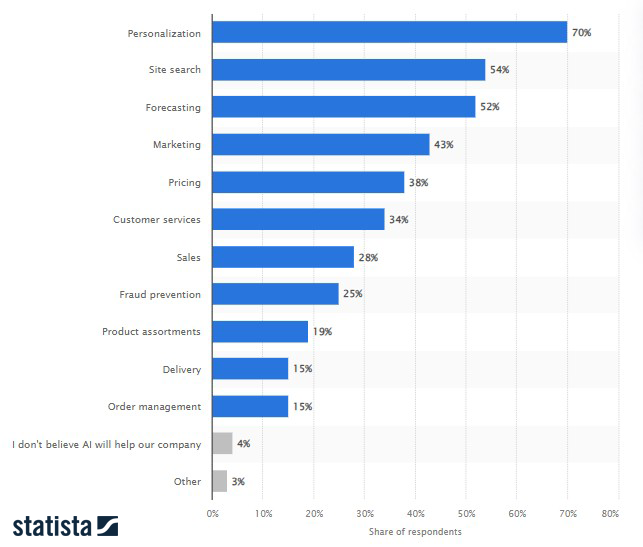
So you’ve seen some cases of how companies use artificial intelligence in their activities, but running businesses often don’t have enough time or resources to develop their own tools, and need ready-made AI solutions for eCommerce.
How does nopCommerce adopt AI in its framework?
Although there isn’t a completely AI-based eCommerce platform available, many solutions incorporate AI technologies to varying degrees. These technologies are often integrated through add-ons/plugins or custom features. For instance, many popular eCommerce platforms seamlessly integrate with third-party eCommerce AI tools for customer segmentation, inventory tracking, and comprehensive analytics.
nopCommerce isn’t an exception. Benefiting from its open-source nature, the platform can integrate with cutting-edge technologies, introduce new tools and features with the help of numerous extensions. The open-source approach encourages the .NET community to participate in the development process and share their useful creations on the nopCommerce marketplace.
One of the most powerful ways to get started with AI in eCommerce is product recommendations. To offer customers enhanced support regarding sales, our Gold Solution partner Innovapps, actively participating in all nopCommerce activities, decided to develop such a plugin which integrates a product recommendation system based on AI into nopCommerce stores. Does it drastically differ from traditional product recommendations?
By default, nopCommerce offers a manual way to configure product recommendations. This means that the store owner has the ability to set up which products are shown on the main page or suggest related products to customers once they choose a particular item. It’s a working method but requires more time to implement and maintain.
To streamline product recommendations, the Google Product Recommendations AI Plugin by Innovapps imports and showcases the recommendations once its model is trained. To make the integration smoother and eliminate the need for extra tools, the plugin also facilitates the export of training data.
Among other things, this AI-powered plugin supports three functionalities:
- To export the product catalog information
- To track events by sending them directly to the GRAI via REST API
- To request predictions via REST API and display those recommendations to the customer.
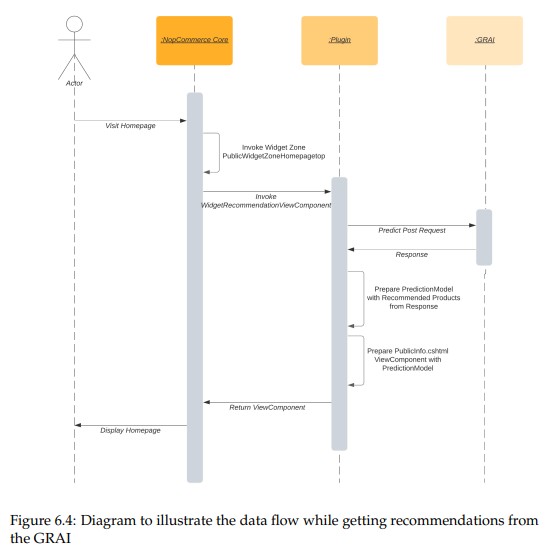
To help store owners improve their business and unlock more eCommerce AI marketing opportunities, the Google Recommendation AI offers additional features.
They include the ability to choose between different model types, master and variant recommendations, select other recommendation placements apart from the homepage, and track optional user events. It is even possible to use different models on different pages. This means that the store owner can configure a “recommended for you” spot on the homepage and a “frequently bought together” recommendation on a product page.
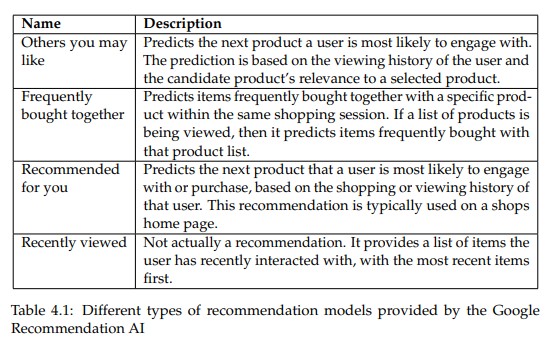
For those who think AI recommendation models do not make a difference, here are the key benefits of using this smart product recommendations plugin:
- 40% conversion rate growth
- 90% click-through rate increase
- Additional sales by stimulating impulse purchases
- More cross-selling & up-selling opportunities
- Improved customer loyalty through better understanding of individual needs.

nopCommerce has more to offer than AI-powered product recommendations. Its well-structured and pluggable architecture easily integrates with other AI tools. For example, an Algolia-based search plugin.
Running a nopCommerce-based website, Super Liquor (a liquor retailer from New Zealand) needed robust search features like intelligent indexing, typo tolerance, search suggestions, and faceted search. As a result, customers now enjoy a seamless search experience and can effortlessly locate their desired products.
These were just two examples of AI use in modern eCommerce. Will nopCommerce be able to handle future AI integrations? Possessing a powerful core, the platform is open to new add-ons and extensions that will bring new functionalities. And the best part is that these upgrades won’t affect overall performance as nopCommerce is ready to scale.
Techscape 2.0: emerging AI trends and technologies
Today, it is undeniable that there is an immense buzz surrounding AI in eCommerce. However, what truly matters is that this whirlwind of innovative technologies is expected to further intensify in the coming years.
Now, let’s delve into additional AI technologies that are set to mold the future of eCommerce:
- Virtual try-on and augmented reality have the potential to revolutionize the retail and fashion sectors. Thanks to advancements in computer vision and machine learning, virtual try-on platforms will empower customers to see how clothes and accessories suit them without actually trying them on.
- Voice commerce is also on the rise. As AI continues to improve its natural language processing abilities, we can expect voice-activated shopping through virtual assistants like Alexa and Google Assistant to become increasingly popular. This means users will be able to make purchases simply by using voice commands.
- Visual search technology empowers customers to effortlessly discover related products by simply uploading images or utilizing their device's camera.
- Social commerce will be revolutionized as AI seamlessly integrates shopping experiences with social media platforms, allowing for in-app purchases and effortless transitions from social content to shopping.
How to stay up-to-date with all these novelties? The best solution is to choose an eCommerce platform that is ready to grow together with your business needs and adopt new technologies on the go.
That’s where nopCommerce as an open-source eCommerce platform truly shines. Thanks to its available source code, pluggable architecture and Web API plugin, it can utilize all AI capabilities as soon as they appear.
Wrapping up
Today, it is impossible to ignore or underestimate the role of artificial intelligence in eCommerce. AI operates tirelessly, without the need for rest or succumbing to distractions or boredom. With AI at the helm, human errors become a thing of the past.
However, the more universal eCommerce AI becomes, the more is the temptation to completely rely on it but the reality is a little bit more complicated. According to recent surveys, many businesses have invested in AI technologies, but only about 15% of them are actually using AI capabilities to their benefit.
Although artificial intelligence for eCommerce can enhance and optimize routine operations, it is important to remember that humans are still the driving force behind the sphere. While AI facilitates growth, it should be viewed as a complementary tool rather than the sole determinant. Instead of diverting attention to flashy technologies that aim to improve existing operations, the primary focus should be on leveraging the expertise of professionals in the field to build upon and refine the core business processes.
Comments